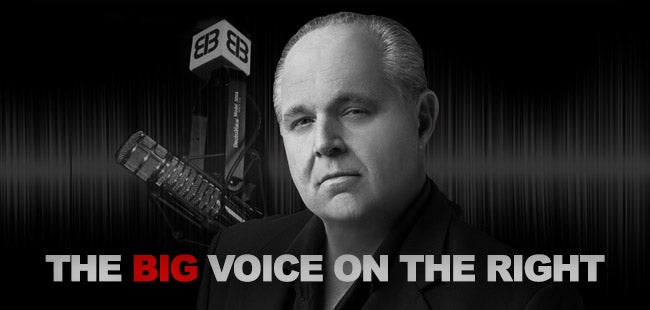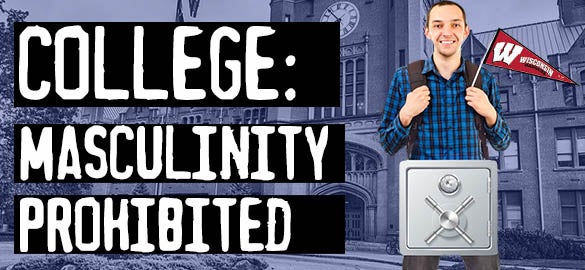RUSH: I was watching Tucker Carlson last night on the Fox News Channel, and, you know, Tucker has this unique aspect. He somehow goes and gets liberal guinea pigs who do not know that they’re guinea pigs. He goes and finds the best daily example of liberal, extreme, wacko stupidity and invites them in and then just throws their beliefs right back at them and asks them to explain it.
And it’s comical, because what is almost always exposed is that these people are just reciting things they’ve memorized. And when certain questions are asked, they have knee-jerk reactions and answers. It’s quite illustrative to watch, because you learn that these people are not thinkers at all. They’re not really engaged. They’ve just been brainwashed and programmed with propaganda, and they know how to recite it. But they’re also, I think, undergoing lessons on how not to let Tucker Carlson get to them.
Last night’s example — have you heard about this? “The Western Kentucky University student government voted Tuesday in favor of reparations for black students in the form of free tuition. The resolution, which passed by a vote of 19-10-0, recommends that the university acknowledge slavery as a ‘debt that will never be paid’ and offer free tuition to black students,” regardless whether they have blood links to slavery, the antebellum days or not. It doesn’t matter, because if you’re African-American, you have roots to slavery, whether you do or don’t, you do and you automatically qualify.
 “The resolution asks that a special task force be created to look into test-optional admissions and admissions weighting based on geographical location, which in theory would make it easier for black students to apply and be accepted to WKU.”
“The resolution asks that a special task force be created to look into test-optional admissions and admissions weighting based on geographical location, which in theory would make it easier for black students to apply and be accepted to WKU.”
What that means, there is a resolution that would create a special task force that would basically say that anybody who wanted to go to the school on the basis that they need reparations because they come from a slave past would automatically be admitted.
And there of course is a leader of this movement. Well, this says Andre (sic) Ambam. That sounds like a male name, right? What I watched last night was a woman and her last name was Ambam, A-m-b-a-m. But let’s just go with what’s written here. “Andre Ambam, one of the resolution’s authors, told the Herald that racial disparity has translated into economic disparity, inhibiting black students from attending college. ‘If you really care about diversity, if you really care about inclusion, if you really care about making this campus safe and accessible to everybody, having the student government’s support of reparation[s] for black students would be amazing,’ Ambam said.”
Now, as I watched this, a couple of things occurred to me. One thing was, why does anybody go to college? I mean, this woman is like everybody else, primarily from the left, but it’s not just restricted to the left. That is, there is a cultural belief or acknowledgment that you must go to college. You must. It is one of these things that if you don’t do, something odd about you. If you don’t want to, there’s something odd about you. It’s just one of these things you have to do. Now, why?
And I’m serious with this question. Why? What is the purpose of going to college? If you’re a parent and you are insistent that your kids go to college, why? What is the ultimate aim? If you are a student who desperately wants go to college, why do you want to go to college? Because when you get to the real answer to that question, then something else occurs to me about this whole argument about reparations and other things that I think exposes what’s really going on.
But I have to take a break now and we’ll continue after this.
BREAK TRANSCRIPT
RUSH: Now, back to this story. And, by the way, it was Andrea. This is a typo. Was not Andre Ambam. It was Andrea Ambam, and that’s what I saw last night on Tucker. And they’ve got a resolution here that they passed at the University of Western Kentucky, or Western Kentucky University suggesting that African-American students be given free tuition as reparations for slavery whether the African-American students have any direct trace to slavery or not. Because there’s been so much discrimination and the discrimination is gonna continue, and the discrimination is never going to end.
Slavery, according to the Andrea Ambam, is a debt that will never be paid. And, as such, young college students, African-American at Western Kentucky U need to get free tuition as a form of reparations. Now, remember, with everything involving liberalism — like this is proposed as a solution, the solution to what? Well, a solution to the never-ending discrimination that was slavery. A solution to the problem that a lot of kids can’t afford to go to college and their parents can’t afford to send them.
So this is presented as a solution. But it never is. In liberalism nothing ever is a solution. It’s just either the starting point for a new program or a new phase in an existing program. But nothing is ever fixed, nothing is ever resolved. It’s just like affirmative action. Affirmative action has no end. When it was devised and concocted, it had no end. There was no plan to say at some point down the line, “Okay, we have leveled the playing field now. We’ve evened the scales. We have made amends for the transgressions of the past.” And I knew this because way back when I talked to people that were the architects of affirmative action, you could really make ’em mad by calling it quotas.
And I asked ’em, “When’s this gonna end? How many years of this is it going to take for all of you activists to say the scales have now been balanced and the discrimination has been ended?” They said never. Affirmative action’s never gonna end because that debt can never be repaid. It was never intended to end. This is never intended to end, either. This is just the beginning of reparations taking whatever form that people demanding them say they want or need. But since this is about college and tuition, I want to go back to the question. Why do people go to college?
Not the people that go that don’t know what to do, they don’t know what they want to do, they’re going there to bide time. I’m talking about people and parents who are actively engaged in the idea of a college education, what is it for? Is it to get educated? Is it to become worldly? Is it to meet people and learn how to be sociable and get along with other people? Is it to be educated so that one can earn a significant amount of money in order to be self-supportive and to eventually have enough to buy a home and to raise a family? What is the purpose here? What are the reparations really for?
And I’ll give you a hint of where I’m going with this. You’ve seen the tax revenues that have been reported as collected by the federal government. The last two years are records. If you add up the federal income tax, the corporate tax, the capital gains tax, the federal government is collecting record tax revenue. Every quarter, the money coming in is a record. We’ve never collected more; we’re never paid more in taxes. Now, it’s another story entirely when you figure out who’s paying it and who’s not. That’s another discussion.
 Okay, so record revenues are coming in. More money to the government than ever before. Now let’s go to the budget. And I’m not talking about Trump’s, I’m not talking about Obama’s. I’m talking about just the way Washington has been working. The budget, as you know, is really, when you get down to brass tacks, not relevant to how much money the government takes in, because every year there is a deficit, a massive deficit, and the total sum of those deficits now add up to a national debt of close to $20 trillion.
Okay, so record revenues are coming in. More money to the government than ever before. Now let’s go to the budget. And I’m not talking about Trump’s, I’m not talking about Obama’s. I’m talking about just the way Washington has been working. The budget, as you know, is really, when you get down to brass tacks, not relevant to how much money the government takes in, because every year there is a deficit, a massive deficit, and the total sum of those deficits now add up to a national debt of close to $20 trillion.
The federal budget is put together every year not based on how much money the government’s gonna raise. And there’s no way anybody else can do a budget this way. If you run a business, your budget has to be totally determined on how much you generate. You cannot spend more than you bring in, unless you’ve got a line of credit at a bank or way to get some sort of credit. But then you’re throwing collateral up, so you’re running the risk of losing your enterprise, no matter how, if you exceed your income.
In your personal household it’s the same thing. You simply cannot go spend more than you have and get away with it for very long without your world crushing you and falling in on you. But what it comes to the federal budget, none of those things are applicable. It’s something called the baseline, the current services baseline that determines every year’s spending. And the current services baseline has nothing to do with how much money is raised. The current services baseline is only related to how much money was spent.
So the current services baseline, let’s say for Health and Human Services — just make up a number — the current services baseline is $500 million — remember I’m just making it up, not related to anything, $500 million, Health and Human Services every year. So that amount becomes the baseline for the next year’s budget, and it can never be smaller. The current services baseline has built-in increases anywhere from three to 10%. It’s written into budget law. At no time is the total income to the government via tax revenue ever calculated. At no time is this income ever considered in terms of how big the overall budget’s going to be.
The budget is determined by how much was spent the previous year, and the premise is, “We cannot spend less. Our needs are increasing. Our people are suffering. Our military needs to get bigger. Our border needs to get stronger.” Whatever it is, it can never get smaller. And yet even with record revenue coming in, do budget writers say: “Man, look at all this money. We can actually cut back some of the budget.” Never happens. So there’s no relation whatsoever to the amount of money government raises to how much money government spends.
Now, let’s take this back to the reparations argument and a college education. We could even stick with the income tax law. The income tax obviously now has nothing to do with how much money the government needs because the government’s already spending more than is raised by the tax code. So the idea that we have to have a tax code based on funding the government, that’s a premise that a lot of people have been made to believe, but it actually is not applicable, because the government’s gonna spend what the current services baseline is regardless how much money’s taken in.
So my question, why is there an income tax at all? If the amount of money that the government raises by taxes is no way related to how much is spent, why tax us at all? Why isn’t every dollar that is spent deficit spending? I mean, we’ve got a national debt of $20 trillion, and it doesn’t seem to be doing any damage, doesn’t seem to be hurting anybody. I’ve heard my whole life the national debt’s going to be the end of this country, and it isn’t, and it hasn’t been. People still predict it. “Well, at some point, Rush, the tipping point’s gonna be reached here, and it’s all gonna collapse like a house of cards.”
 Except you forget, we got a printing press, and we have a Federal Reserve, and we got the ChiComs that own a bunch of debt, so we can’t default. The U.S. government can’t default. So why tax us at all? If the amount of money raised via taxes has nothing to do with what’s spent — and don’t let anybody tell you it does. They want you to think it does. The budget writers, I don’t care what party, Washington wants you to think that there is budget discipline based on revenue raised in the tax code. But it isn’t. It’s all related to the current services baseline.
Except you forget, we got a printing press, and we have a Federal Reserve, and we got the ChiComs that own a bunch of debt, so we can’t default. The U.S. government can’t default. So why tax us at all? If the amount of money raised via taxes has nothing to do with what’s spent — and don’t let anybody tell you it does. They want you to think it does. The budget writers, I don’t care what party, Washington wants you to think that there is budget discipline based on revenue raised in the tax code. But it isn’t. It’s all related to the current services baseline.
So why are we paying any tax at all? Well, the answer is obvious. It’s two-pronged. We do need to help defray some of the costs, obviously, but it’s not the primary reason. Social architecture. You know what the greatest inhibitor to amassing wealth is? The greatest inhibitor is not a lack of education. The greatest thing standing in the way of most people’s acquisition of wealth is the personal income tax.
BREAK TRANSCRIPT
RUSH: Here’s Peter. Peter, Virginia Beach, Virginia. Welcome. Great to have you on the EIB Network. Hello.
CALLER: Hello, Rush. It’s truly a pleasure to get through to you.
RUSH: Thank you.
CALLER: I have a question about Kentucky reparations. My children are mixed. I’m white. My wife is Dominican. Dominicans are 38% African genetically, so my children are 19% African. Is that 19% enough to qualify for free tuition?
RUSH: Damn right. Yep. All you need’s a thimble.
CALLER: If it is, I can get rid of my Android and get an iPhone.
RUSH: Yeah, you don’t even have to have a direct trace to slave blood. It’s total skin color. Nineteen percent? More than you need to qualify for reparations. Are you thinking of sending them to Western Kentucky when they get old enough?
CALLER: You know, my son’s a junior. Fortunately he’ll have really good options ’cause he’s a really good wrestler and schools like him for wrestling. So, you know, he’s got schools interested. My daughter, she’s an average student, better-than-average student —
 RUSH: They’re gonna be fine. You keep ’em on that track. They’re gonna be fine. His real question, he was asking, what’s the limit? If we’re gonna start doing reparations in the form of free tuition, what’s the limit? Whether you know it or not, that is a brilliant question. The answer: there is no limit. There’s no limit to reparations. There’s no limit to the size of government. There’s no limit to how much the government should pay you. There’s no limit to how much the people you disagree with should be punished. There’s no limit whatsoever to anything. That’s who they are.
RUSH: They’re gonna be fine. You keep ’em on that track. They’re gonna be fine. His real question, he was asking, what’s the limit? If we’re gonna start doing reparations in the form of free tuition, what’s the limit? Whether you know it or not, that is a brilliant question. The answer: there is no limit. There’s no limit to reparations. There’s no limit to the size of government. There’s no limit to how much the government should pay you. There’s no limit to how much the people you disagree with should be punished. There’s no limit whatsoever to anything. That’s who they are.
BREAK TRANSCRIPT
RUSH: No, no, the question is very simple: Why do these kids want to go to college at all? If they’re asking for reparations, why go to college? Why are they there? What they want is money! Why waste college? Just ask for the money. What’s the point of going to college? If you’re gonna get the money, you don’t need to. More on that in a minute.
BREAK TRANSCRIPT
RUSH: Along the lines of this reparations story, Western Kentucky University student government voted Tuesday in favor of reparations for black students. Oh, let me close the loop on one thing. My question, why do people go to school? How would you answer that? When you send your kids to college, why? What do you hope the result is? Are you hoping they come out of there educated? Are you hoping they come out of there prepared?
Are you hoping they come out of there with their minds intact and they haven’t been corrupted by liberalism? Are you hoping they come out of there able to make a lot of money? What are you hoping for? You send people to college because that’s just what we do. You don’t have a chance if you don’t go to college. It’s just the thing to do. It’s still a source of great pride to have a child graduate college. That’s a big deal. But what is the purpose for most people going?
In the case of these people seeking reparations, what do they want? They want money. Obviously, the reparations movement is about one thing, and it’s about — well, it’s about one thing, money, but the premise behind their expectation of money is multifaceted. But they want reparations in the form of free tuition. But is a degree in “hands up, don’t shoot” studies guaranteed to make them a lot of money? My point is, is getting a college degree, is that equal to making a good living? Is it a guarantee to acquiring money?
 Look. It’s a multifaceted answer. College can teach you how to shake people down. College can teach you how to cheat. College can teach you how to blow up the university. College can teach you how to deny conservatives. It can teach you a lot of things. This is my point: Why do you send your kids there? Okay, granted. If you want to be a doctor, you have to go, at least for now you have to go. If you want to be a lawyer, you have to go. Those reasons are obvious. But if you’re going to college for a degree in “hands up, don’t shoot” studies, say, or anything else, why are you there? Why are your parents sending you there? Why do your parents want you to go there?
Look. It’s a multifaceted answer. College can teach you how to shake people down. College can teach you how to cheat. College can teach you how to blow up the university. College can teach you how to deny conservatives. It can teach you a lot of things. This is my point: Why do you send your kids there? Okay, granted. If you want to be a doctor, you have to go, at least for now you have to go. If you want to be a lawyer, you have to go. Those reasons are obvious. But if you’re going to college for a degree in “hands up, don’t shoot” studies, say, or anything else, why are you there? Why are your parents sending you there? Why do your parents want you to go there?
So now we come to these students at Western Kentucky who are African-American and it doesn’t matter whether they can trace it or not, because they’re black they’ve got slavery in their past, and that makes them entitled to reparations. The reparations they want is free tuition. A college degree isn’t a guarantee of anything. So I’m just saying why are you taking the long route? What you want is money. Just demand the money.
Why even waste the four years in college? Just say you want reparations, and you want the money. Don’t give it to the school. You want the equivalent of four years’ tuition to this school and you don’t ever have to go, and you don’t have to waste your time getting a meaningless degree in “hands up, don’t shoot” studies or whatever it is you take.
Wait a minute, now. Whoa, whoa, whoa, whoa, whoa. I’m talking about college, I’m talking about college. Going to college is not payback. Reparations is payback. And that will never end. If they are given the equivalent of a four-year tuition to go to Western Kentucky, you think when the four years are over and they still got no money, that they’re gonna be satisfied, they’re gonna be gratified, “Thank you for paying my reparations”?
What they’re gonna say is, “What good did this do me? I didn’t see a dime of it. It all went to the school, and I had to sit here four years, and I’ve got this worthless degree in ‘hands up, don’t shoot’ studies. I need more. You tricked me.”
Something about this, folks, doesn’t compute with me. I think the reason behind this is actually quite studied. If you are demanding reparations but not money, I think the thinking is that it may make people more amenable. If you can grant reparations by simply opening the doors to your university and letting people come in, I mean, it costs you income, but it doesn’t cost you spending. You’re not actively spending any money. The reparation would include room and board and books, the whole thing or they wouldn’t accept it.
My point is, that after the four years of reparations like this, the recipients still got zilch. They’ve got nothing and they’re gonna realize that. And they’re not gonna be happy. And they’re gonna think they were tricked into asking for reparations in the form of tuition, and they’re gonna be twice as mad. And the people that thought they had done great things by granting the reparations in the form of tuition will be hit again for having cheated them out of real reparations.
You see how this works? Do you think the university will eventually go for this? You don’t think so? You don’t think reparations are coming? You don’t? I think we’re already paying ’em in a lot of ways.
BREAK TRANSCRIPT
 RUSH: Now, ladies and gentlemen, I want to very cleverly and sneakily demonstrate the political and moral vacancy of liberalism. And let’s take this reparations proposal at Western Kentucky University. Andrea Ambam, who was the student representative on Tucker Carlson, the Fox News Channel last night, explaining why. She said, Andrea Ambam, last night, that her parents are immigrants, that she is not a descendant of American slaves, but she thinks nevertheless that all blacks should get free tuition, reparations, whether they are the descendants of U.S. slaves or not.
RUSH: Now, ladies and gentlemen, I want to very cleverly and sneakily demonstrate the political and moral vacancy of liberalism. And let’s take this reparations proposal at Western Kentucky University. Andrea Ambam, who was the student representative on Tucker Carlson, the Fox News Channel last night, explaining why. She said, Andrea Ambam, last night, that her parents are immigrants, that she is not a descendant of American slaves, but she thinks nevertheless that all blacks should get free tuition, reparations, whether they are the descendants of U.S. slaves or not.
You know why? Because they face so much discrimination. Whether they have a genealogical trace, whether they have slave blood or not, they still should get reparations like she should, because they face so much discrimination. Now, she said she’s an immigrant. That means her parents came here. If this place, America, features so much discrimination against people of color, why did her parents come here in the first place? What is the reason?
If this place is so discriminatory that people of color should be paid compensation for putting up with it, why come here in the first place? It’s a classic illustration of the moral and political vacancy of liberalism. You can use the same glittering example in immigration. We’re told that countries in Central America and South America, they may be war-torn, but, oh, they’re beautiful places and they’ve got wonderful cultures, and this America place, what a rotgut hellhole.
This place is filled with discrimination, racism, bigotry. There’s rape every day on college campuses. There’s a bunch of Republicans running around trying to deny everybody their free speech rights. You’ve got guns everywhere. You got people standing in the way when you want to get an abortion. Why the hell would they want to bring anybody here for? I mean, really.
Out of one side of their mouths, pro-illegal immigration and sanctuary city advocates portray America as the armpit of the world, maybe the groin of the world, it is that bad a place. It’s filled with bad guys, white racists, anti-women white guys, sexual harassment everywhere, rape everywhere, standing in the way of your right to a free abortion, standing in the way of your right to free health care.
Why do they want to come here if this place is so bad? And it’s a legitimate question, legitimate hypocrisy. Why bring anybody that you love and cherish like illegal immigrants, why bring them to this hellhole? Why, Andrea Ambam, did your parents bring you here or come here if they’re going to face a lifetime of discrimination? Why do it? For the money?
BREAK TRANSCRIPT
 RUSH: By the way, I’ve got another question for Andrea Ambam. If it’s so bad, why do you stay? It’s one thing for your parents to come knowing that there is going to be a lifetime of discrimination, bigotry, racism, and all that. Why come? But you were born here. Why stay? If this place, if the United States of America is just the hellhole of the world with all of this bigotry and racism and hatred and misogyny, denial of human rights for women and minorities and, why stay, Andrea?
RUSH: By the way, I’ve got another question for Andrea Ambam. If it’s so bad, why do you stay? It’s one thing for your parents to come knowing that there is going to be a lifetime of discrimination, bigotry, racism, and all that. Why come? But you were born here. Why stay? If this place, if the United States of America is just the hellhole of the world with all of this bigotry and racism and hatred and misogyny, denial of human rights for women and minorities and, why stay, Andrea?
Now, don’t misunderstand; I’m not telling her to leave. I’m asking a question. Why stay? Are you telling me that all it would take for you to put up with all this discrimination is somebody to pay your tuition for four years or however long you’re gonna be there at Western Kentucky? Why stay? Why come? Why would you bring people you love to such a rotten place as the United States?
And then after they get here, why would you continue to run down the United States? After you brought ’em here, you brought ’em here as illegals, you got ’em in the sanctuary city, and you brought ’em for what reason? There’s no opportunity here ’cause it discriminates against people like this, so what did you do bringing them here? Why do they stay if it’s such a bad place? Why don’t they realize they’ve been tricked and they’ve been snookered into coming here as future voters for the Democrat Party, but it’s a hellhole? Why don’t they leave? Because as you’ve told us, they come from beautiful places, oh, El Salvador, Nicaragua, Mexico, such wonderful, culturated places. Why don’t they return, if America sucks the way you say it does? Rhetorical questions, folks, don’t misunderstand.
BREAK TRANSCRIPT
RUSH: Okay. Tucker Carlson to Andrea Ambam, who wants reparations in the form of free tuition at Western Kentucky University, Carlson said, “Look, even people whose families didn’t suffer under state sponsored discrimination or under slavery would be entitled to that? I mean, from looking at the numbers, these groups tend to do pretty well. In a lot of cases they outearn native-born Americans. Why would they be entitled to this also or to any special consideration?”
AMBAM: You’re using the word “entitled,” and I don’t know if that’s the right word. When we talk about African immigrants who come here and face racial discrimination, I can actually speak on this very uniquely because I am the daughter of immigrants who came here. There is unique discrimination that faces African immigrants that many people don’t talk about.
RUSH: Why’d you come here? This is what I don’t understand. This place is so rotten, this country is so rife with discrimination and judgmentalism and bigotry and homophobia and anti-tranny, anti-woman, anti-gay, what is all this stuff, and yet people continue to pour in here in droves. Why? I think this represents, illustrates the moral-political vacancy of these people, and exposes what their agenda really is.
Here’s Dennis in St. Louis. Dennis, hey, great to have you on Open Line Friday. Hi.
CALLER: Hello. It’s a pleasure to talk to you today.
RUSH: Thank you, sir.
CALLER: So bear with me as I kind of play devil’s advocate here.
RUSH: All right.
CALLER: With reparations, maybe we should be asking who should pay reparations and to who? In Dinesh D’Souza’s last movie, we know President Lincoln paid reparations, the whole 40 acres and an army mule. And after Lincoln was assassinated, Andrew Johnson returned that land to former slave owners. We know Lincoln was a Republican president. Johnson, he was a Southern Democrat.
RUSH: Hm-hm.
 CALLER: So perhaps we should ask, before we start any reparations debate, should the Democrats pay reparations to Republicans? Well, who fought to end the war of slavery? The Republican Party. Against who? Southern Democrats. And who went on to write all these Jim Crow laws?
CALLER: So perhaps we should ask, before we start any reparations debate, should the Democrats pay reparations to Republicans? Well, who fought to end the war of slavery? The Republican Party. Against who? Southern Democrats. And who went on to write all these Jim Crow laws?
RUSH: Right. I know. I know. And who ran the anti-black South, not letting ’em into universities and turning dogs and the fire hoses on ’em? I think that’s exactly right. So in that sense you have a point: If there are reparations to be paid, it’s the Democrats that owe them. It’s the Democrats that owe ’em.
BREAK TRANSCRIPT
RUSH: Here is Marianne in Brooklyn. Marianne, great to have you on the EIB Network. Hi.
CALLER: Hi, Rush! How are you?
RUSH: Good. Very good.
CALLER: I was a lifelong Democrat but now I know how to look at both sides and will never vote for another Democrat again in my life. But I’m nervous. I’m not married, but I have two cousins. I have a cousin that went to Penn State, I had a cousin that went to UConn, and they seem to have a better chance ’cause they have more networking opportunities and internships. But all these kids think that if they have a diploma, there’s some gravitas to this diploma. They take out these loans, they go to these tiny little colleges in the middle of nowhere, and they can’t find jobs. I have a cousin who has a criminal justice degree. He’s gone to every police department. Well, now he’s in the jail working in the mail room for $8 an hour. And, Rush, you know, at $8 in the New York Area —
RUSH: Heh.
CALLER: — you ain’t going nowhere.
RUSH: If he’s got a criminal justice degree, he should apply at NCIS or CSI: New York or something like that, a TV show. There’s more crime on those shows than in the streets.
CALLER: (chuckling)
RUSH: You know, but you raise a good point. When you said that young people come out of these colleges with diplomas and think that their future is right there in front of them. It’s not their fault! Look at how college education… Look at how that is sold today. Look at how it’s presented. It’s your ticket.
CALLER: Yeah, your ticket to the big time.
RUSH: Ticket to the big time. But it’s instant gratification is one of the characteristics of youth today.
CALLER: Yeah.
 RUSH: The idea of waiting until you’re 40, until the world opens up? “Don’t insult me. What do you mean, wait ’til I’m 40?” When they find out that doors don’t automatically open, they don’t figure out why. They’ve been misled about the value. They’ve been misled about the speed with which things are gonna happen because of this.
RUSH: The idea of waiting until you’re 40, until the world opens up? “Don’t insult me. What do you mean, wait ’til I’m 40?” When they find out that doors don’t automatically open, they don’t figure out why. They’ve been misled about the value. They’ve been misled about the speed with which things are gonna happen because of this.
CALLER: Right. I’m 60 at the moment. I’ll be 60 in October and I’m unemployed. Try and find a job when you’re 60 and unemployed. My mom worked ’til she was 79 in a hospital in the kitchen and worked a full-time, eight-hour shift.
RUSH: Well, what do you want to do?
CALLER: Well, it’s tough, Rush. You know, I went to the Brooklyn Navy Yard ’cause they have a state program, a federal program and a city program, and it said they had jobs opening up for entry level. And then I read an article in the newspaper, and it was from someone in the city council that said they wanted to pull up the illegals into these middle-class jobs. I doubt if I’ll be hearing from them any time soon. But I read an article I wanted to tell you about, about our esteemed governor, Andrew Cuomo, who in 2016 created 757 jobs and in 2015 created 141 jobs, and in 2014 created 76 jobs. He spent $53 million on advertising for these jobs because he’s got some program up state going.
RUSH: Well, he’s gotta get reelected.
CALLER: Yes, I know. He wants to be president. Meanwhile, he hasn’t done a damn thing.
RUSH: Let’s take this back to you. You are 60, and I don’t know how you view 60, but have you…? When I said, “What do you want to do?” you didn’t answer me. You started talking about, “Well, I’m looking here and there.”
CALLER: No, I —
RUSH: No, this is a big deal: What do you want to do? What do you want do?
CALLER: (chuckle) Rush, I really would love to be a chef. But at this point I have bulging and herniated disks and stenosis. So that’s out. But I don’t really know what to do! I have to find something that will fit into my disability at the moment, and that’s tough.
 RUSH: Well, that is tough. I acknowledge. But I have… The only place I’m going with this is that I’ve always found that if you’re able to identify a desire that you’re gonna get closer to being passionate about that than you will be about something that just comes your way, and since life is to be lived and enjoyed, it’s not… Life is not to be endured and suffered, and it’s not a slog. It’s not designed to be. It doesn’t have to be. I mean, I know it is for all of us at times. But we only get one. There’s only one. We don’t get do-overs in terms of the entire life.
RUSH: Well, that is tough. I acknowledge. But I have… The only place I’m going with this is that I’ve always found that if you’re able to identify a desire that you’re gonna get closer to being passionate about that than you will be about something that just comes your way, and since life is to be lived and enjoyed, it’s not… Life is not to be endured and suffered, and it’s not a slog. It’s not designed to be. It doesn’t have to be. I mean, I know it is for all of us at times. But we only get one. There’s only one. We don’t get do-overs in terms of the entire life.
So there’s nothing wrong with actually trying to find a way to get paid doing what you like, whatever it is. And in your case, I know you’re 60. You have to fill your day doing something. I’m gathering, I would assume that most of what you try to do during the day is stuff that you enjoy or at least don’t dislike. And that, to me, would always be… That’s what I did. You know, I got fired a whole bunch of times in radio. As a deejay at age 28, I figured I had failed. I was too old to be a rock ‘n’ roll teenage disc jockey.
So I went to work for a baseball team, and after five years I realized I didn’t like corporate structure. So decided I’d better go back to what I like, ’cause that’s where I’m at least gonna be happy. So I went back to radio, and I tried it in a different way. I’ve just believed that. People I’ve studied and seen who have basically have a day where they have more ups than downs, they’re doing what they like. They have found a way to get paid for something that they like and are passionate about. And it’s not that hard, and it makes much more sense. I know there are compromises.
You need money. You have time to wait to find that thing that actually pays you for doing what you want, so you have to stopgap. But never giving up the quest for what you’re really passionate about, what you really like — and sixties? I disagree! It’s not too old. Depends on how creative, inventive, that you want to be. And all of its predicated on desire. Desire is the great equalizer, because once you have the desire, there’s nothing stopping you, other than you. Anyway, so, you hang in there. You’ll find something. And don’t depend on Cuomo. You have just told us how you can’t depend on Cuomo to find you a job. What, 800 people he’s employed here in however many years?


